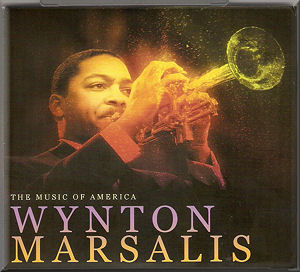CD 1
Express Crossing (Astride Iron Horses) - from: Jazz: 6 1/2 Syncopated
Movements 5:12
"D" in the Key of "F" (Now the Blues) - from: Jazz: 6 1/2 Syncopated
Movements 5:16
Jump - from: Jump Start - The Mastery of Melancholy 4:23
Station Call - from: Big Train 2:10
The Caboose - from: Big Train 7:08
Church: Renewing Vows (Instrumental) - from: Sweet Release & Ghost
Story 7:19
Go, Possum, Go (Instrumental) - from: Reeltime 2:02
Jean-Louis Is Everywhere - from: The Marciac Suite 4:56
For My Kids at the CollŠge of Marciac - from: The Marciac Suite 4:02
Sunflowers - from: The Marciac Suite 9:58
Hellbound Highball (Instrumental) - from: At The Octoroon Balls -
String Quartet No. 1 8:21
The Fiddler's March (Instrumental) - from: At The Octoroon Balls -
String Quartet No. 1 3:27
Movement 1: Jubal Step - from: All Rise 11:22
Movement 12: I Am (Don't You Run From Me) - from: All Rise 11:53
CD 2
The Majesty Of The Blues (The Puheeman Strut) - from: The Majesty
Of The Blues 15:07
The Dance - from: Jump Start - The Mastery of Melancholy 3:38
Move Over - from: Blood on the Fields 10:04
Double Rondo On The River (Pedro's Getaway) - from: Tune in Tomorrow
9:27
Spring Yaound‚ - from: Citi Movement 6:00
Soul For Sale - from: Blood on the Fields 6:08
Altar Call - from: In This House On This Morning 1:29
In The Sweet Embrace of Life Sermon: Holy Ghost - from: In This House
On This Morning 16:04
The Death Of Jazz - from: The Majesty of the Blues 12:39
Oh, But On The Third Day (Happy Feet Blues) - from: The Majesty of
the Blues 6:45
Wynton Marsalis (trumpet) with various bands, accompanists, singers
rec. c. 1989-2002
Detractors will say that Wynton Marsalis wouldn't be Wynton Marsalis if this 2 CD compilation album were not to be furnished with some grandiose title and here it is; `The Music of America'. They will say that if you naively thought there were musics of America, pluralities that embraced Copland, Ellington, Bluegrass, Ragtime, King Oliver, Sinatra and whoever else or whatever else you like, then take a note from the New Orleans Master Blaster himself, or his publicity machine. But hold on, that is the generic series title; Marsalis is just one of a number of subjects thus celebrated in the Music of America marque. What looks like vainglory is actually just a series title.
If you've not collected his records, this is a relatively painless and inexpensive way to get to grips with at least some of the protean talent that is Marsalis. Many of his major statements are reflected in the two well-filled discs. There's the Ellingtonian castoff that is Jazz: 6 1/2 Syncopated Movements whose tricksy railroad rhythms would not have surprised the Duke. Jump, from Jump Start - The Mastery of Melancholy mines the Ducal small band ensemble for its effect and has the added advantage of featuring Sweets Edison.
Texture is a constant feature of Marsalis's work; so too the elemental tropes of classic jazzwise Americana, which are seldom far from Marsalis's pen; railroad rhythms and horns, vistas, parade ground marches, loose limbed New Orleans funerary music, Gospel, the primacy of the voice. Along the way he pays obeisance to Miles Davis in Sunflowers whose modal, filmic quality so resolutely evokes the Prince of Darkness (who apparently scorned the younger man) that it's uncanny. I like Marsalis best when he's most down home; then the rhythms gets shaken around a bit and more productively. When he jousts with Stravinsky, as he is apt to do (old standby: ask a jazz musician to name two classical composers; Answer; Bach and Stravinsky) he comes off tenth best.
But give him a trickster trumpet line, so that he can bend and twist the tone, and he's the man. Give him a blues drenched number like Spring Yaound‚ from Citi Movement and he comes up trumps. He can preach with the best of them, and pay due homage when he installed guitarist and banjoist Danny Barker in his band for his The Majesty of the Blues.
Perhaps, then, the grandiosity and grandstanding should be placed to one side; the Stavinskyisms ignored and the Marsalis kernel extracted. Along the byways, fruitful and fruitless, exposed in this twofer you will find many an important musician and many an engaging (if sometimes overlong) track.
Jonathan Woolf
